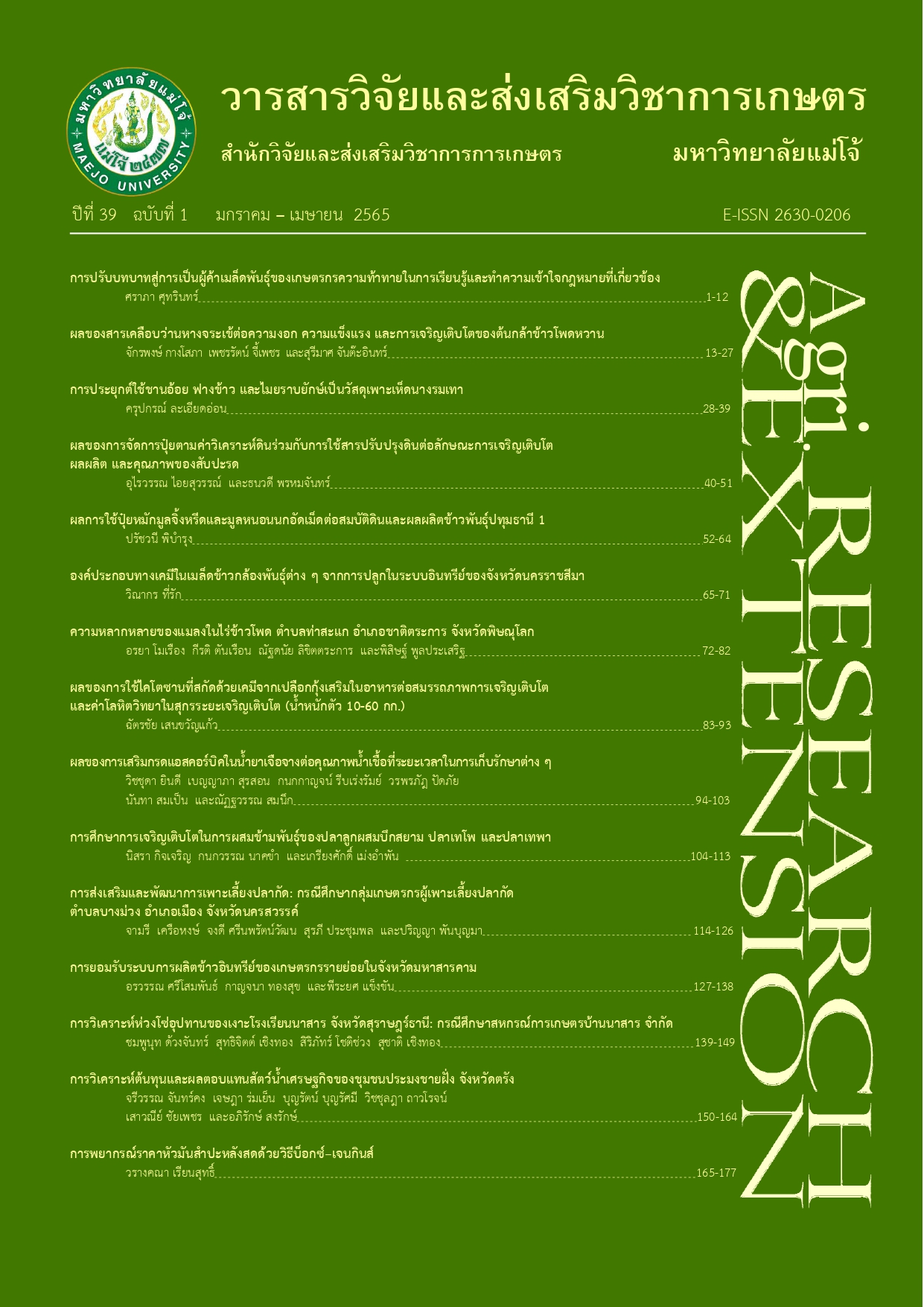การยอมรับระบบการผลิตข้าวอินทรีย์ของเกษตรกรรายย่อยในจังหวัดมหาสารคาม
คำสำคัญ:
การยอมรับ , เกษตรอินทรีย์ , เกษตรกรรายย่อย , การดำรงชีวิตอย่างยั่งยืนบทคัดย่อ
การศึกษาครั้งนี้มีวัตถุประสงค์เพื่อวิเคราะห์ปัจจัยที่มีอิทธิพลต่อการยอมรับการปลูกข้าวอินทรีย์ของเกษตรกรในจังหวัดมหาสารคาม และเสนอแนะแนวทาง การส่งเสริมการผลิตข้าวอินทรีย์ที่เหมาะสม โดยใช้วิธีการสัมภาษณ์และเก็บแบบสอบถาม จากเกษตรกรผู้ปลูกข้าวจังหวัดมหาสารคาม ปีการเพาะปลูก พ.ศ. 2561/2562 เป็นเกษตรกรที่ปลูกข้าวแบบอินทรีย์จำนวน 80 ครัวเรือน และข้าวทั่วไปจำนวน 80 ครัวเรือน รวมจำนวนตัวอย่าง 160 ครัวเรือน ใช้การสุ่มตัวอย่างแบบเจาะจงร่วมกับการสุ่มตัวอย่างแบบง่าย และวิเคราะห์ข้อมูลโดยใช้แบบจำลอง Logistic regression ตัวแปรตาม คือ การยอมรับการปลูกข้าวอินทรีย์ ส่วนตัวแปรอิสระ ได้แก่ ขนาดพื้นที่เพาะปลูกของเกษตรกร และระยะทางจากบ้านถึงแปลงนา รายได้นอกภาคการเกษตร ทัศนคติด้านราคา อายุ ระดับการศึกษา เพศ จำนวนสมาชิกในครัวเรือน ทัศนคติด้านสุขภาพ การเป็นสมาชิกกลุ่มองค์กรทางการเกษตร การใช้โทรศัพท์มือถือในการรับข่าวสาร การไปทัศนศึกษาดูงานนอกสถานที่ และทัศนคติด้านการส่งเสริม ผลการศึกษาพบว่า ปัจจัยที่มีอิทธิพลเชิงบวกต่อการยอมรับการปลูกข้าวอินทรีย์ ได้แก่ ทัศนคติด้านสุขภาพ ทัศนคติด้านการส่งเสริม ระดับการศึกษา จำนวนสมาชิกในครัวเรือน การเป็นสมาชิกกลุ่มองค์กรทางการเกษตร และการศึกษาดูงานนอกสถานที่ ในขณะที่เกษตรกรที่มีรายได้จากนอกภาคการเกษตรมากจะมีแนวโน้มในการยอมรับการผลิตข้าวอินทรีย์ลดลง ข้อเสนอแนะสำคัญจากผลการศึกษา คือ การกำหนดนโยบายเพื่อเพิ่มจำนวนผลผลิตข้าวอินทรีย์ ควรคำนึงถึงรูปแบบการสื่อสารกับเกษตรกร โดยเฉพาะประเด็นอันตรายของสารเคมีต่อสุขภาพ เน้นกลุ่มเป้าหมายที่มีรายได้หลักมาจากการปลูกข้าว ร่วมกับการจัดกิจกรรมศึกษาดูงานนอกสถานที่ จะช่วยให้การดำเนินนโยบายดังกล่าวบรรลุตามวัตถุประสงค์
เอกสารอ้างอิง
Ashley, C. and D. Carney. 1999. Sustainable Livelihoods: Lessons from Early Experience. London: DFID. 64 p.
Chanoun, N. 2014. Thailand Food Security. [Online]. Available http://library.senate.go.th/ document/Ext7091/7091777_0002.PDF (16 January 2020).
Chaowagul, M., S. Rungsipathra, O. Sirisompun, and C. Choesawan. 2016. The Adaptation to Drought of Rice Farmers in Irrigated Areas with Evaluation on Integrated Mitigation Project to Farmers Affected by Drought Project. Bangkok: Thailand Research Fund. 306 p. [in Thai]
Chiengkul, P. 2017. The Political Economy of the Agri‐Food System in Thailand—Hegemony, Counter‐Hegemony, and Co‐Optation of Oppositions. Routledge: Oxford Press. 216 p.
Dana, L.P. 2014. Asian Models of Entrepreneurship: from the Indian Union and Nepal to the Japanese Archipelago: Context, Policy and Practice. Second Edition. Singapore: World Scientific. 424 p.
Department of Agricultural Extension. 2016. Farmer map: Maha Sarakham. [Online]. Available https://ssnet.doae.go.th/wpcontent/uploads/2016/05/mahasarakham-24-05-59.pdf (19 January 2021). [in Thai]
Ebers, A., T.T. Nguyen and U. Grota. 2017. Production efficiency of rice farms in Thailand and Cambodia: a comparative analysis of Ubon Ratchathani and Stung Treng provinces. Paddy Water and Environment 15: 79-92.
Janjarean, K. 2011. Identifying Population and Sampling. [Online]. Available https://www.ict.up.ac.th/surinthips/ResearchMethodology_2554/.PDF (19 January 2021). [in Thai]
Jierwiriyapant, P., O. Liangphansakul, W. Chulaphun and T. Pichaya-Satrapongs. 2012. Factors affecting organic rice production adoption of farmers in Northern Thailand. Chiang Mai University Journal of Natural Sciences 11(1): 327-333.
Jiumpanyarach, W. 2017. Sustainable impacts on organic farmers in Thailand: lessons from small-scale farmers. Journal of Social Sciences Srinakharinwirot University 20: 199-215. [in Thai]
Ketpirune, O. 2012. Persuasion in planting organic rice with research. Journal of Community Development Research 5(1): 113-124. [in Thai]
Leklang, S., P. Mankeb and T. Limunggura. 2011. Factors Affecting the Decision Making on Organic Rice Production of Farmers in Surin Province. 157 p. In Proceedings of 49th Kasetsart University Annual Conference: Agricultural Extension and Home Economics. Bangkok: Kasetsart University. [in Thai]
Lukrak, N. and D.A.T. Sindecharak. 2013. Problems and barriers in changing to organic vegetable production of ratchaburi farmers who qualified in the organic farming development project. Thai Journal of Science and Technology 2(2): 125-133.
Panyakul, V. 2006. Organic Rice and Sustainable Trade Economy. Bangkok: Thailand Research Fund. 114 p. [in Thai]
Panyakul, V. 2016. Overview of the organic situation of Thailand in 2016. [Online]. Available http://www.greennet.or.th/article/411/ (16 January 2020).
Pattanapant, A. and G.P. Shivakoti. 2013. Opportunities and constraints of organic agriculture in Chiang Mai province, Thailand. Asia-Pacific Development Journal 5(1): 115-147.
Penvern, S. 2014. Agroecological Crop Protection in Organic Farming: Relevance and Limits. pp. 101-130. In Bellon S., and S. Penvern (eds.). Organic Farming, Prototype for Sustainable Agricultures. Heidelberg: Springer.
Pongsrihadulchai, A. 2020. PGR: roadmap to promote organic agriculture for smallholder in Thailand. [Online]. Available https://ap.fftc.org.tw/ article/1869 (16 March 2021).
Pornpratansombat, P., B. Bauer and H. Boland. 2011. The adoption of organic rice farming in Northeasters Thailand. Journal of Organic Systems 36(3): 4-25.
Ricepedia. 2019. The global staple. [Online]. Available http://ricepedia.org/ rice-as-food/the-global-staple-rice-consumers (15 January 2020).
Rittinon, C. and M. Uruyos. 2017. Effect of leadership on organic farming adoption decision. Applied Economics Journal 24(1): 37-23. [in Thai]
Sangkumchaliang, P. and W.C. Huang. 2012. Consumers’ perceptions and attitudes of organic food products in Northern Thailand. International Food and Agribusiness Management Review 15(1): 87-102.
Sarker, M.A., Y. Itohara and M. Hoque. 2009. Determinants of adoption decisions: The case of organic farming (OF) in Bangladesh. Extension Farming Systems Journal 5(2): 39-46.
Serrat, O. 2017. The sustainable livelihood approach. [Online]. Available http://doi.org/10.1007/978-981-10-0983-9_5 (30 January 2020).
Sierra, L., K. Klonsky, R. Strochlic, S. Brodt and R. Molinar. 2008. Factors Associated with Deregistration among Organic Farmers in California. California: Institute for Rural Studies, Department of Agricultural and Resource Economics, UC Davis University of California Cooperative Extension. 24 p.
Siriwiriyasomboon, N., T. Mekhora and S. Limunggura. 2016. Alternative: factor affecting farmers’ adoption of safety vegetable in Bangyai district, Nonthaburi province. King Mongkut’s Agricultural Journal 30(2): 59-67. [in Thai]
Srisompun, O., S. Simla and S. Boontang. 2019a. Production efficiency and household income of conventional and organic jasmine rice farmer with different farm size. Khon Kaen Agriculture Journal 47(Suppl.1): 857-862.
Srisompun, O., S. Simla and S. Boontang. 2019b. Storage decision of Jasmine rice farmer in Thailand. Journal of the International Society for Southeast Asian Agricultural Sciences
(1): 80-91.
Statista. 2019. World rice acreage from 2008/2009 to 2016/2017 (in million hectares). [Online]. Available https://www.statista.com/statistics/271969/world-rice-acreage-since-2008/ (15 January 2020).
Sujaritturakarn, W. and J. Tanapanyaratchawong. 2010. Factors influencing the adoption of production techniques and applications of organic fertilizer for farmers in Hatyai district, Songkhla province. Suranaree Journal of Social Science 4(1): 29-44. [in Thai]
Suwanmaneepong, S., C. Kerdsriserm, K. Iyapunya and U. Wongtragoon. 2020. Farmers’ adoption of organic rice production in Chachoengsao province, Thailand. Journal of Agricultural Extension 24(4): 71-79.
Thapa, G. and K. Rattanasuteerakul. 2011. Adoption and extent of organic vegetable farming in Mahasarakham province, Thailand. Applied Geography 31(1): 201-209.
Veldstra, M., A. Corinne and M. Maria. 2014.
To certify or not to certify? Separating the organic production and certification decisions. Food Policy 49: 429-426.
Villano, R. and E. Fleming. 2006. Technical inefficiency and production risk in rice farming: evidence from Central Luzon Philippines. Asian Economics Journal 20(1): 29-46.
Xiong Y., X. Li and P. He. 2016. Farmers’ adoption of pollution-free vegetable farming in China: economic, informational, or moral motivation? Cogent Food & Agriculture 2(1): 1-16.
ดาวน์โหลด
เผยแพร่แล้ว
รูปแบบการอ้างอิง
ฉบับ
ประเภทบทความ
สัญญาอนุญาต
ลิขสิทธิ์ (c) 2022 วารสารวิจัยและส่งเสริมวิชาการเกษตร

อนุญาตภายใต้เงื่อนไข Creative Commons Attribution-NonCommercial-NoDerivatives 4.0 International License.
บทความนี้ได้รับการเผยแพร่ภายใต้สัญญาอนุญาต Creative Commons Attribution-NonCommercial-NoDerivatives 4.0 International (CC BY-NC-ND 4.0) ซึ่งอนุญาตให้ผู้อื่นสามารถแชร์บทความได้โดยให้เครดิตผู้เขียนและห้ามนำไปใช้เพื่อการค้าหรือดัดแปลง หากต้องการใช้งานซ้ำในลักษณะอื่น ๆ หรือการเผยแพร่ซ้ำ จำเป็นต้องได้รับอนุญาตจากวารสาร





